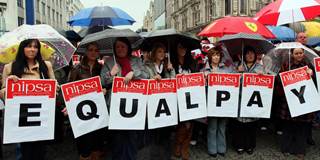One hundred years after securing the right to vote in the UK, women everywhere are still fighting for equality. Beyond the rational argument, however, women's fight embodies a moral demand that can be met only by restructuring the way choices are presented.
LONDON – February 6, 2018, marked the centenary of the Representation of the People Act, which enfranchised (some) women in Britain for the first time – a reward for women’s work during World War I. In honor of this historic event, statues of two leaders in the struggle for women’s suffrage, Millicent Fawcett and Emmeline Pankhurst, are to be erected in British cities.
The economic emancipation of women had to wait till after World War II, when permanent male labor shortages – the result, incidentally, of Keynesian full-employment policies – pulled ever more women out of domesticity and into factories and shops. This second wave of emancipation concentrated on economic inequalities, especially discrimination in job selection and disparities in pay and property rights.
These battles have also mainly been won. Discrimination in inheritance is long gone, and equal pay for equal work is accepted in theory, though a gender bias persists (as it does for selection to senior posts). For example, Carrie Gracie recently resigned as the BBC’s China editor in protest against unequal pay between male and female editors, shaming six top male employees to agree to substantial wage cuts.

LONDON – February 6, 2018, marked the centenary of the Representation of the People Act, which enfranchised (some) women in Britain for the first time – a reward for women’s work during World War I. In honor of this historic event, statues of two leaders in the struggle for women’s suffrage, Millicent Fawcett and Emmeline Pankhurst, are to be erected in British cities.
The economic emancipation of women had to wait till after World War II, when permanent male labor shortages – the result, incidentally, of Keynesian full-employment policies – pulled ever more women out of domesticity and into factories and shops. This second wave of emancipation concentrated on economic inequalities, especially discrimination in job selection and disparities in pay and property rights.
These battles have also mainly been won. Discrimination in inheritance is long gone, and equal pay for equal work is accepted in theory, though a gender bias persists (as it does for selection to senior posts). For example, Carrie Gracie recently resigned as the BBC’s China editor in protest against unequal pay between male and female editors, shaming six top male employees to agree to substantial wage cuts.